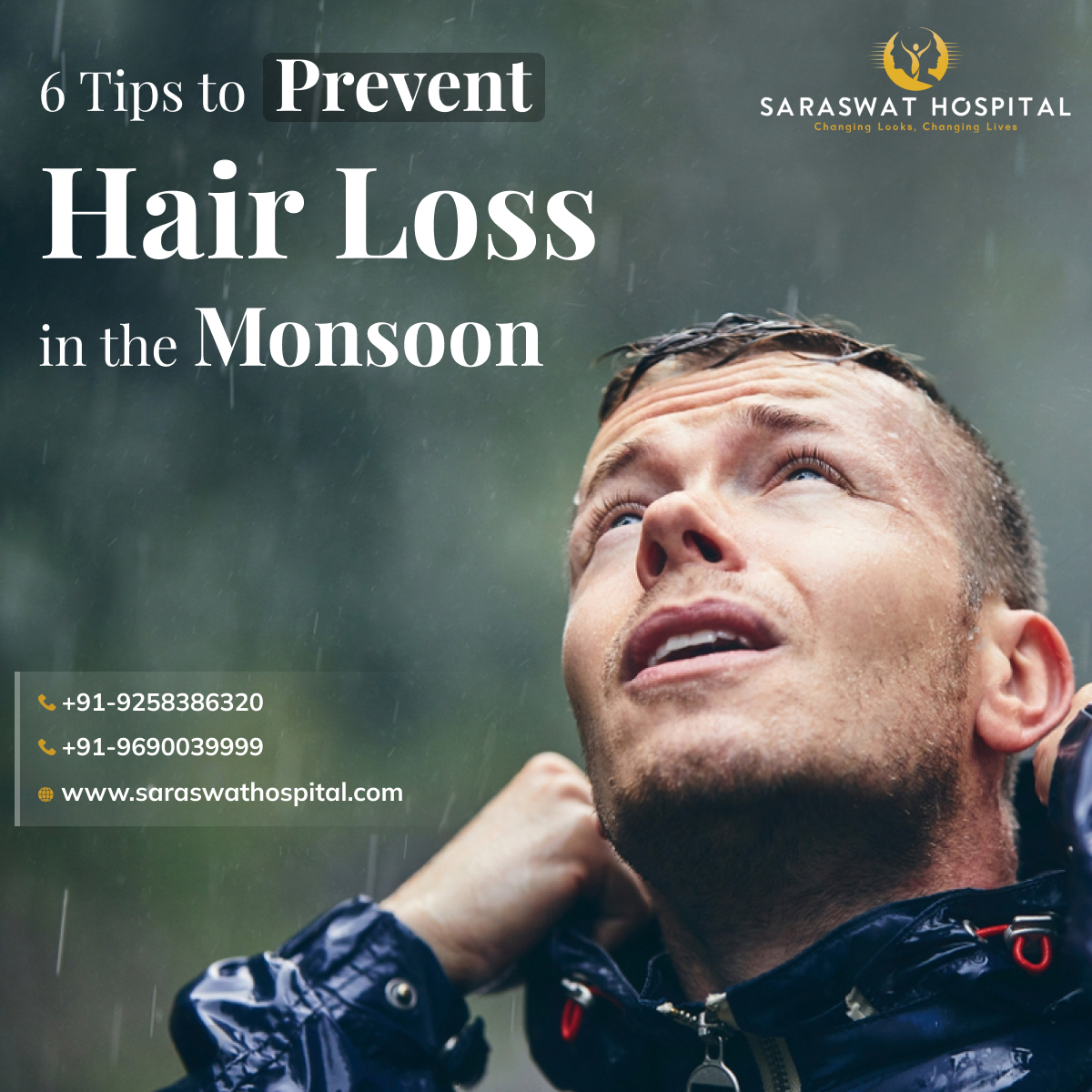The monsoon feels so good; nature becomes greener, and we get relief from the scorching heat. Everything seems good and beautiful in the monsoon except one thing. In this season, many experience increased hair fall. Losing nearly 50 to 100 strands of hair in a day is normal. However, if you are losing more hair than normal and facing other issues like an itchy scalp, dandruff, infections, etc., you should go for an effective hair loss treatment as soon as possible.
It’s frustrating to see that your hair is shedding faster than raindrops! Losing a lot of hair can affect your overall appearance and confidence level. However, you don’t need to worry, as we are here with an expert-backed quick guide that can help you prevent hair loss in the monsoon.
Reasons Behind Increased Hair Loss in the Monsoon
There can be various reasons behind increased hair fall in the monsoon, such as increased humidity, fungal infections, hormonal imbalance, nutrient deficiency, and so on. If your hair fall condition worsens, consult with the best hair doctor in Agra, India, or elsewhere and get the right treatment.
-
Fungal Infections
The monsoon season brings a humid environment that promotes the growth of fungi and bacteria. These microorganisms can cause infections like ringworm, dandruff, etc., leading to more hair fall. Also, itchy and irritated scalp conditions can weaken the hair roots, making them prone to breakout or fall.
-
Excessive Humidity
Due to high humidity, our scalp can get oily and sticky, causing clogged hair follicles. Clogged follicles also weaken hair roots and cause more hair fall. The increased moisture present in the air can also weaken the hair shaft and make it more prone to breakage.
-
Weakened Hair Roots
The fluctuation in weather and humidity during the monsoon can cause stress to your hair roots. The constant changes in temperature and moisture levels can also weaken hair roots and cause more hair fall.
-
Oil Imbalance
The humidity and uncertain changes in weather can affect the natural oil balance of the scalp. It may cause more oil secretion and clog hair follicles. On the other hand, applying oil in this season can increase the growth of Malassezia, which causes dandruff and scalp inflammation, leading to more hair fall.
-
Lack of Nutrition
During the rainy season, many people experience a change in appetite and eating habits and tend to consume more fried and junk foods. It can cause a lack of nutrition in the body and hair loss. Poor nutrition can affect your overall health. Due to poor nutrition, hair loss can occur in any season. Be careful about food intake, follow a balanced diet, and avoid foods that can cause gastronomical issues.
In order to learn more about hair loss causes and treatment, watch this video by Dr. Preeti Saraswat (ABHRS-diplomat).
How Can You Prevent Hair Fall in the Monsoon?
Preventing increased hair fall in the monsoon is not a challenge if you follow a few simple tips. Even after trying many things, if you are not getting rid of increased hair fall, take the help of a doctor. Often, one or more internal factors can contribute to more hair fall. Before it gets delayed, consult an expert hair restoration doctor and get the best hair loss treatment.
1. Keep Your Hair Dry and Clean
In this humid weather, keep your hair dry and clean to prevent excessive hair fall. We all feel a bit more lethargic during the rainy season and often take less care of our hair. To maintain good hair health and reduce hair fall, you should follow a healthy hair care routine regardless of the season. In order to reduce hair breakage and fall, keep your hair dry and clean.
Do not use hair dryers to dry your hair after a wash. You can use a lightweight microfiber towel to gently soak up the water. Don’t rub your hair hard; do it gently.
2. Use a Mild Shampoo
Use a mild shampoo to wash your hair. You can go for a mild shampoo that is free from harsh chemicals such as parabens and sulphates. Ask your dermatologist to prescribe a gentle shampoo suitable for your scalp and hair type. Many people experience increased dandruff this season, and they can use ketoconazole-infused shampoo for relief. Before using any medicated hair product, consult with an expert doctor.
3. Always Wash Away the Rainwater
If you get drenched in the rain, try to wash your hair immediately afterward. Rainwater may contain pollutants and chemicals from the air, which can damage the hair bulb and clog hair follicles. This can cause your hair to become dull, thin, dry, and brittle.
4. Do not Comb Wet Hair
There is no benefit to combing your wet hair. It takes more time and causes more hair to fall. When hair is wet, it is weaker and more vulnerable to breakage, split ends, and damage. Let your hair get dry naturally, and then use a wide-tooth comb to detangle it.
5. Stay Hydrated
If you are not hydrated, your body will signal you that in various ways—increased hair fall is one of those signals. According to the International Society of Hair Restoration Surgery (ISHRS), if you don’t drink enough water on a regular basis, it can lead to more hair fall. In the summer, we generally drink more water, and many people reduce their water intake in the monsoon as the heat gets lower. You should drink enough water, keep your digestive system healthy, and stay hydrated to ensure better hair health.
6. Follow a Balanced Diet
Taking care of your diet and protein intake is vital for preventing hair fall in the monsoon. You should follow a balanced diet that contains nutrients like vitamins (A, C, and E) and minerals (iron and zinc) to promote hair health. Incorporate protein-rich foods like eggs, nuts, leafy vegetables, fruits, etc. in your diet. Protein is the building block of your hair, so take care of your protein intake.
Conclusion:
Following these simple tips, you can reduce hair fall in the monsoon. If your hair fall issue continues season after season, you should seek the help of expert hair restoration doctors. Many people come to Saraswat Hospital to get the best hair loss treatment in Agra. Here, you can consult with Dr. Satya Saraswat and Dr. Preeti Saraswat, diplomats of the American Board of Hair Restoration Surgeons (ABHRS). They are also members of ISHRS (the International Society of Hair Restoration Surgeons) and have more than 19 years of experience. If your hair loss condition is getting out of control, consult with these eminent doctors as soon as possible.








Leave a Reply